Allen Ginsberg
The
משורר
with
!חוצפה
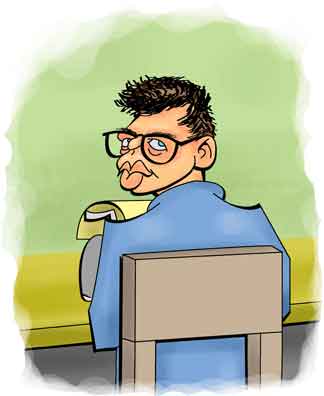
Allen Ginsberg
!חוצפה
Allen Ginsberg was once described by a literary critic as one of America's minor poets. But, the critic hastened to say, being one of America's minor poet is no small matter.
Others, though, see Allen as one of the towering figures of 20th century literature. He and the "Beat" writers laid down the foundations for modern authors to follow - whether the modern authors know it or not.
Allen was born June 3, 1926 in Newark, New Jersey. His father, Louis, was an English teacher, and Louis and Allen's mom, Naomi, had been active in what were once caused "progressive" causes to help the less fortunate. During the Great Depression that was a lot of people.
When Allen was still young Naomi began to suffer from mental problems. She believed that she had wires inside her head and people, including Louis, were plotting against her. In 1932, when Allen was only six, she was confined to a mental hospital.
Naomi underwent the then accepted treatments for the mentally ill, including electroshock therapy and the now totally discredited procedure, the lobotomy. Although there were times where she was calm enough, her delusions persisted all her life, and she died, still hospitalized, in 1956.
Although Naomi's illness caused Louis no ends of problems, Allen was somehow always able to cope with his mother's "spells". Six years after his mother's death, he published his poem, Kaddish, in Naomi's memory. Some people saw Allen's relationship with his mother as laying down the foundation for his ability to relate to people who don't quite fit in.
Louis continued his career as a teacher, but he was also a doer. He was a published poet, and this interest had rubbed off on his son. But Louis felt a poet's lot was not a happy one and told Allen to be a poet "only if he couldn't help it".
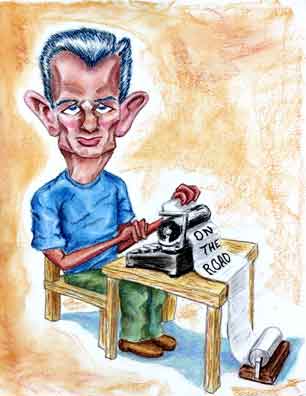
Jack Kerouac
The King of the Bums
Allen couldn't help it, of course. But when he entered Columbia University in 1943 it was with the sincere intent of becoming a labor lawyer to help the working men and women.
While at college Allen met a young and husky fellow named Jack Kerouac. Jack had been given a football scholarship but later dropped out and joined the Merchant Marines.
It was Jack who coined the phrase "The Beat Generation" and he is famous as the "King of the Beats" (although taking everything together "King of the Bums" is perhaps more apt). Two of Jack's buddies were Lucien Carr (not a Beat writer himself but following a two year stint for manslaughter, was an editor for UPI) and William Burroughs. Bill was an older man - twelve years Allen's senior - who had a particular fascination with drugs, alcohol, and weapons, a fascination that led to him to accidentally kill his wife while playing William Tell.
The Columbia crowd eventually included a number of eclectic individuals, but remained centered around Bill, Lucien, Jack, and Allen. Even at that early stage, they regarded themselves as a unique group of talented and original individuals (even if they did say so themselves) who would do great things in the world of literature. At the time, though, they mostly did what college kids and their friends have always done. They hung out together, partied, sometimes went to class, talked, and in general, had as good a time as possible.
In 1948 Allen heard William Blake reciting his poems "Ah, Sunflowers", "The Sick Rose", and "Little Girl Lost". The problem was that at the time Allen was alone laying back on his bed and William had been dead for over a hundred years. Allen took this episode to be a mystical experience and he decided that poetry was his true calling.
Nevertheless Allen continued at Columbia. He was a good student and graduated with a BA in 1948. However, he stuck around New York where some of his friends were less than reputable.
One of his less stellar acquaintances was Herbert Hunke. Herbert was a skid row drug addict with literary pretensions and like many skid row drug addicts would resort to thievery to support his habit. This led to problems.
The details of Allen's Problem of 1949 varies in the telling. One story is that the police paid a visit to Allen's apartment and found some of Herbert's stolen goods. Another is that Allen and some others were trying to dispose of Herbert's incriminating evidence and ended up being chased by the police and wrecking the car. Of course the variant tellings are by no means exclusive.
In any case Allen, Herbert, and the rest were arrested. Herbert, with an honesty that Allen always appreciated, took the rap and got five years in prison. As part of the plea deal, Allen agreed to commit himself to the Psychiatric Institute of the Columbia Presbyterian Hospital.
We read that Allen's doctors decided to "straighten him out" to use a phrase favored by follicularly challenged citizens of a Quaint State of the American Southwest. Had they succeeded Allen would have been turned into a staid, normal, and most boring person.
However, a recent re-evaluation of the hospital records has convinced a psychiatrist that in the year after graduation, Allen had been under such stress that his hospitalization provided a much needed respite. Far from stifling his creativity, she says the enforced stay gave Allen time to turn his mind to his poetry.
When he was released Allen kept visiting a psychiatrist. In one session he said that he wished he could make a living from his poetry.
"Why don't you?", the doctor asked. Allen, he pointed out, was a smart fellow. He could do it.
In any case after Allen got out of the hospital, he moved to San Francisco where a number of the Beats had already absconded. The new literati centered around Lawrence Ferlinghetti and his City Lights Bookstore.
Allen's most famous poem, Howl, has one of the best openings ever penned (or rather typed). Some, though, hold that the quality does not stand up throughout the long and at times difficult poem. Instead they complain that the poem rambles on and it's hard to see what Allen's driving at.
That Allen's words do wander can't be denied and interviewers also found that when left to his own devices he tended to wander off topic1. At least the interviewers didn't have to worry about getting Allen to open up. A 20 word question might elicit a 1000 word response. For some reason, though, if you hear Allen in an interview, what he says always seems to make sense.
Rambling or not, when Allen read a selection of "Howl" at City Lights, it created a sensation. The news of the poem and its author spread and Allen was asked to to give a reading at Berkeley. Allen was now seen not only as a leader of, but the leader of the Beats (increasingly referred disparagingly as "beatniks").
Unfortunately the Beat Lifestyle as practiced by Allen, Bill, Jack, and the others was not one intended to keep one in robust good health. For years Bill Burroughs had been a heroin addict and later switched physician-prescribed methadone. He published his most famous novel, Naked Lunch, in 1964. Naked Lunch is accurately described like James Joyce's Finnegan's Wake as a much purchased but little read work of literature. The book, though, was involved in a court case which finally ended the nonsense of banning books because of content. Then following a rent hike in New York City, Bill moved to Lawrence, Kansas, where he adopted cats and lived, still addicted to methadone, until 1997 when he died of a heart attack.
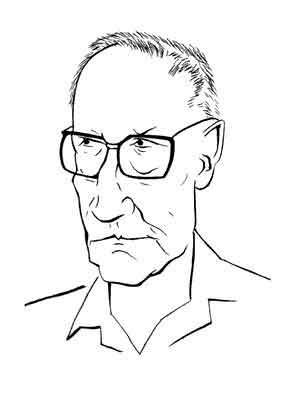
William Burroughs
Rather Strange
Like Naked Lunch, Howl was also the subject of a court challenge. The City Fathers of San Francisco had been shocked! shocked! at the language. Copies were seized and Allen and Lawrence were charged with obscenity. But when the case went to trial the judge, The Honorable Clayton Horn, ruled that "Howl" was not obscene.
Naturally sales skyrocketed. Allen became a celebrity, and a famous photograph by Gordon Ball shows a group of cadets at the Virginia Military Institute reading Howl and Other Poems.
If Allen had become famous, Jack Kerouac has become iconic. His book On the Road, which has now suffered the indignity of being required reading in high school English classes, sold well but returned Jack little financial reward. On the Road was the antithesis of Naked Lunch. A lot of people bought Bill's book, but few read it. Jack himself grumped at how On the Road was more read than purchased. Most of the books were 50¢ paperbacks and were passed around from hand to hand, netting Jack only a few pennies per copy.
With little financial recompense, Jack and his second wife Stella moved in with his mother in Florida. There he continued his plunge into alcoholism, and when he appeared on television interviews and panel discussions, the viewers saw a pathetic, middle aged, befuddled, and disruptive drunk slobbering utter nonsense. In 1969, at age 47, he suffered a hemorrhage while watching the Galloping Gourmet on television and died the next day2.
Footnote
This story seems a little too bathetic to be true. Here we have one of the most important authors in history dying while watching a cooking show! Recently an article on a popular informational website stated that Jack was sitting in his chair, yes, but was working on a book.
However Stella, Jack's wife said they were indeed watching The Galloping Gourmet. Jack finished a snack of tuna fish. He then began hemorrhaging and was taken to a hospital where he died the next day.
Although seemingly disorganized, many of the Beats sought out formal spirituality. They did, though, eschew religions that preached people who disagreed with their doctrines would, nay, should suffer. Instead, they preferred non-Messianic eastern religions.
Alan became a Buddhist which is a religion which Buddhists themselves point out does not exclude practice by other faiths. Alan became associated with Naropa University in Boulder, Colorado which was the first Buddhist affiliated university to be accredited in the United States.
It was in 1967 that the "beatniks" suddenly morphed into the "hippies". Allen made the transition with aplomb and he remained a fixture of the counter-culture scene.
Adopting a bushy beard and the de rigueur long hair, he was soon labeled as the guru of the flower power3 crowd. With his unique appearance he was immediately recognized by the public.
Footnote
Guru - or in Hindi गुरु - means "master" or "teacher. A guru instructs people in the ways of Hindu and Buddhist spirituality.
Flower power was a phrase used during the hippie era as a general term for using non-violence to achieve peace, justice, and equality. Some have said Allen coined the term but that is not completely certain.
Although the Beats had been around since the 1940's they had been scarcely noticed until the late 1950's. It was only in 1959 that they began to attract any attention as the "beatniks".
The word "beatnik" had surprisingly longevity. In 1966 the popular "Man from Uncle" TV show featured an episode called "The Pop Art Affair". In what was certainly one of the least credible of the shows, Napoleon and Illya were trying to capture an evil Thrush villain who got rid of his enemies by exposing them to a gas that caused (and this is not made up) fatal hiccups. Of course like any good Thrush villain, he had to have a cover, and so he doubled as a Greenwich village art dealer who sold pop-art created by the local - and it's the word used in the script - "beatniks".
Now although there were some beat elements written into the script (espresso, jazz, poetry readings), from their dress and the references to folk music, the generation gap, and "happenings", most of the young people that Napoleon and Illya met were clearly hippies - or at least a crude parody as expected from a network television show. But the word hippie was never used.
It wasn't just out of touch scriptwriters who thought hippies were beatniks As late as February 1967, no less a personage than Hunter S. Thompson appeared on To Tell the Truth and referred to the corner at Haight and Ashbury as the "beatnik" section of the San Francisco. So well past the mid-1960's, even the cognoscenti were calling the crazy young people beatniks.
But the next month - March 1967 - Life magazine ran a column by Loudon Wainwright, Jr. (whose son, Loudon Wainright, III, made "Dead Skunk in the Middle of the Road" a hit) and wrote how the time of the hippies was at hand. Suddenly the beatniks were gone, and it was clear that the two groups were not the same.
A crucial difference beween the Beats and the Hippies was the degree of politicization. Beats - or "beatniks" - were largely apolitical and perfectly happy to exist in a "square" world as long as they were allowed to be cool. The hippies were different. They did want to change the world.
Allen made the transition from Beat to Hippie seamlessly and joined the demonstrations against the Vietnam War and other disruptions contrary to peace and harmony. Although the hippie mantra was "Never trust anyone over thirty" an exception was made for Allen who turned 41 in 1967.
Since classifying people with the liberal-conservative dichotomy is dictated by todays simplistic thinking, we have to label Allen as a liberal. But his philosophy was no march-in-a-straight-line-to-the-left doctrine. He once went to visit Cuba, and naturally people expected a typical fawning idolatry about the Revolution with the stereotypical platitudes thrown out in praise of not only Fidel Castro, but also of the conspicuously absent Che Guevara, who was still alive and had not yet reached the iconic status of being a t-shirt for teenagers.
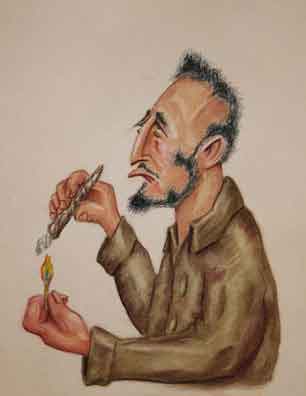
Fidel
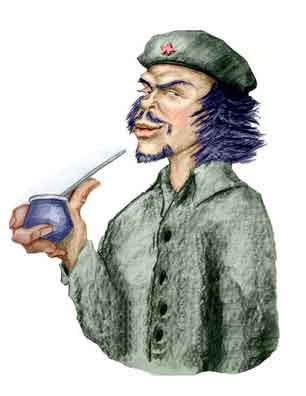
... and Che
Instead when Allen gave his talks he began to trash the Cuban government - not for its economic system - but for it's censorship of the press, stifling of freedom of expression, and persecution of homosexuals (the latter a quite common trait in many countries). Needless to say Fidel was miffed and soon booted Allen out of the country.
In 1969 the residents of Haight Ashbury held a symbolic funeral for the hippies and the next year a major magazine mentioned that flower children were a thing of the past. A news story highlighted how the hangouts of the hippies was now a skid row, and psychedelic decor soon became standard set-design for old quiz programs. By the mid-1980's the hippie phenomenon was long over.
And Allen?
Well, by then Allen was practically mainstream. After a visit to a barber and the donning of a suit and tie, he noted how pleasant it was to be able to walk down the street and not be recognized.
Brooklyn College offered Allen a professorship and he began teaching classes and seminars on Shakespeare, 19th century poets, John Dryden, and of course William Blake. Allen didn't just drone on about the poets but tried to get the students to write poetry themselves. Allen, like many teachers, found that sometimes the college students were not as enthusiastic as he was. But when a group of high school students visited his class, they loved it.
By the 1990's Allen had been awarded a a National Book Award, the Robert Frost Medal, and elected to the American Institute of Arts and Letters. He had received grants from the Guggenheim Foundation, the National Endowment for the arts, and the Rockefeller Foundation. Yes, Allen had become not only mainstream but respectable.
Allen had used drugs in his college days, and he, like many denizens of the mid-twentieth century, was a fairly heavy smoker. In his later years he was under regular medical supervision appropriate for a gentleman of his years. Then on one visit to his doctor, he was diagnosed with liver cancer. He returned to his small apartment in Manhattan and two days later on April 5, 1997, age 70, Allen died.
References
Ginsberg: A Biography, Barry Miles, Simon and Schuster, 2000).
I Celebrate Myself: The Somewhat Private Life of Allen Ginsberg, Bill Morgan, Viking, 2006.
"Allen Ginsberg: 1926-1997", Academy of American Poets.
Howl and Other Poems, Allen Ginsberg, City Lights Books, 1956.
Howl and Other Poems, Allen Ginsberg, Fantasy Records, 7906.
"Before 'Howl'; The Hospital", Scott Timberg, The Los Angeles Times, January 7, 2007.
"Ginsberg in Hospital", Janet Hadda, American Imago, Johns Hopkins University Press, Volume 65, Number 2, Summer 2008, pp. 229-259
"The Playboy Interview With Allen Ginsberg", Paul Carroll (Interviewer), Playboy, April 1, 1969.
"Jack Kerouac's Ex-Girlfriend Lifts Lid on Beat Novelist's Rise and Fall", Dalya Alberge, The Observer, September 15, 2012.
"The Poem That Changed America: 'Howl', Fifty Years Later", Greil Marcus, The New York Times, April 9, 2006.
"The Rebellion against God: Emily Dickinson’s Influence on Allen Ginsberg", Rima Bhattacharya, Journal Of Humanities And Social Science, Volume 19, Issue 4, April 2014.
"He Honored Death, Too: The Subterranean Life of Jack Kerouac", Christopher Wayne, State University of New York College at Buffalo Department of History and Social Studies Education, December 2012.
Aquarius Revisited, Pete Whitmer with Bruce Van Wyngarden (MacMillan Publishing, 1987).
Book of Haikus, Jack Kerouac, Penguin Books, 2003.
"Allen Ginsberg to Teach At Brooklyn College", The New York Times, March 21, 1986, March 21, 1986, Section C, Page 17.
"11th-Graders Visit Allen Ginsberg's Poetry Class",Harold Bauld, Brooklyn Beat, Columbia Magazines, September 01, 2006.
Poem Generator.